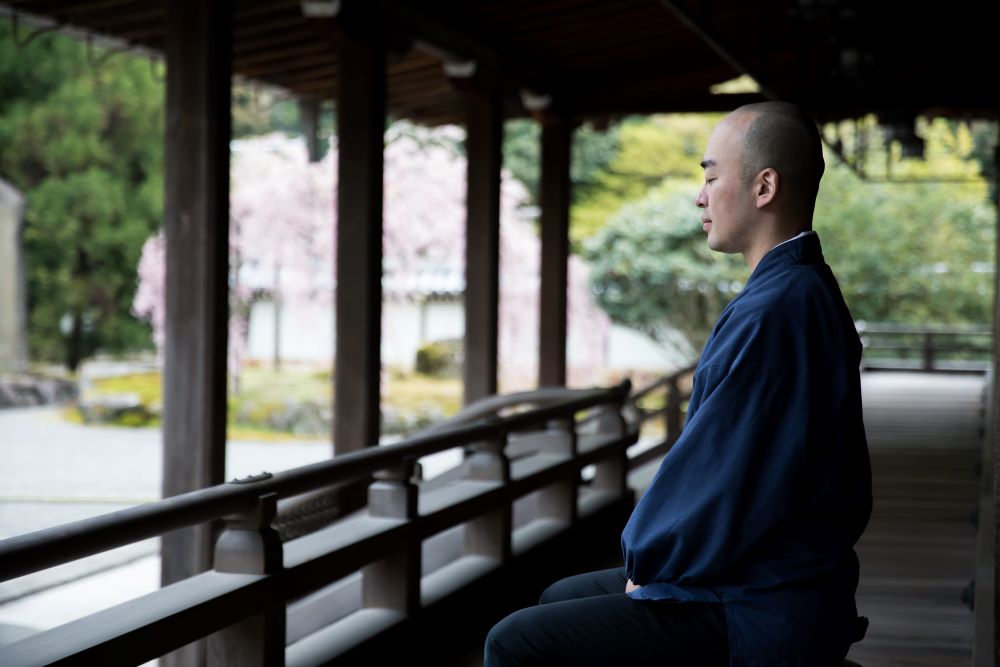2024.6.20
Winds of Gold—One Hundred Views of Saihoji Vol. 2
Peter MacMillan / a translator, scholar, poet
In this series of essays on Saihoji the renowned translator of Japanese poetry and poet Peter MacMillan records his impressions of and reflections on his visits to the garden throughout the four seasons. We hope that through these essays you the readers and fans of Saihoji can feel as if you are also present in the magical garden even when you cannot visit us.
A Moss Garden by Any Other Name Would be Just as Green
Many of the readers will be familiar with the famous lines of Shakespeare’s play Romeo and Juliet:
What’s in a name? That which we call a rose
by any other name would smell as sweet.
This is the origin of the popular adage in English which paraphrases the original: “A rose by any other name would smell as sweet.”
In the play Juliet and Romeo were from families that were mortal enemies of each other so they were not allowed to marry. Juliet’s lines assert that the names of things are not important and that it is not important that Romeo is from her family’s rival house of Montagu. Comparing Romeo to a rose she implies that even if his name was not Romeo, he would still be very handsome and still be her love. Later the adage came to be used often to show that names are not important but the substance of something is what is important.
However, the naming of things is highly important and there are often differences in the way we perceive titles in English and Japanese. The sub-name for Saihoji in Japanese is choritsu (tuning) and hirameki (inspiration). It is a little hard to grasp in English what is meant by “tuning” oneself on a visit to the garden, though the idea of being inspired is highly comprehensible. In my conversations with the temple, we realized that we would sometimes have to create separate copies in English and Japanese. And that is when I started thinking of another sub-name for the garden.

The Vice Head Monk Mr. Fujita told me that his idea of the garden was as a place of reflection, including reviewing one’s failures, on all the things that had happened in one’s life to this point, so that one could make a new beginning, but I felt that the idea of reflecting on one’s failures was a little negative for non-Japanese. I wanted to honor Fujita’s basic concept but also adapt it to a natural way of thinking in English.
One morning while I was walking in the garden, I noticed the little boat in a corner of the pond. I have always loved to see that little boat as it seems full of the sense of possibility as I always imagine it about to set off on some mythic journey. That gave me the idea of journeys. And then I adapted the idea of reflection to returning to one’s origins— it includes reflection, but also can mean a highly positive re-evaluation of one’s life from one’s beginnings to the present moment. When the visitors return to their origins, they will be ready to embark on new journeys. By the time I finished my walk in the garden the name “The Garden of Origins and Journeys” had formed in my mind. The garden taught me the name. I just listened to her thoughts and wrote them down.
Would the moss garden be just as green if it had another name? I end with a new version of Juliet’s speech:
That which we call moss garden
by any other name
would be just as sweet and green!
Peter MacMillan
Peter MacMillan is a prize-winning translator, scholar, poet, and President of The Moon is a Boat Co., Ltd.
His translation, One Hundred Poets, One Poem Each (Hyakunin Isshu), was published in 2008, winning prizes in both Japan and the United States. After that, he completed an English translation of The Tales of Ise (Ise Monogatari), which was published by Penguin in 2016. He has also published a collection of poetry entitled Admiring Fields.
Awards:
Recipient of the Donald Keene Center Special Prize for the Translation of Japanese Literature
Recipient of the 44th Special Cultural Translation Prize from the Japan Society of Translators
Nominated for the PEN Award for Poetry Translation for the English translation of The Tale of Ise (Ise no Monogatari)

Up next
Most read

Your Heart
“The Concept of Muda”





